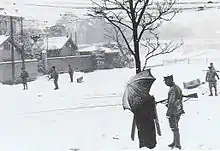1936 in Japan
Events in the year 1936 in Japan. It corresponds to Shōwa 11 (昭和11年) in the Japanese calendar.
| |||||
| Decades: |
| ||||
|---|---|---|---|---|---|
| See also: | Other events of 1936 History of Japan • Timeline • Years | ||||
Incumbents
- Emperor: Hirohito[1]
- Prime Minister:
- Keisuke Okada, until March 9
- Kōki Hirota, from March 9
Events

Hanzōmon, February 26, 1936
- February 5 – Japanese Baseball League is founded.
- February 6 – Ricoh founded.
- February 26–29 – February 26 Incident (二・二六事件, Niniroku Jiken): The Imperial Way Faction engineers a failed coup against the Japanese government; some politicians are killed.
- February 27 – Tokyo is placed under martial law (not to be repealed until July 16)
- February 29
- Prime Minister Keisuke Okada, a target in the February 26 incident, emerges from hiding.
- Emperor Hirohito orders the Japanese army to arrest 123 conspirators in Tokyo government offices; 19 of them are executed in July.
- Facing overwhelming opposition as the army moved against them, the rebels surrender
- March 4 – The Emperor signs an ordinance on March 4 establishing a Special Court Martial (特設軍法会議 tokusetsu gunpō kaigi) to try those involved in the February 26 uprising.[2]
- March 9 – Pro-democratic militarist Keisuke Okada steps down as Prime Minister of Japan and is replaced by radical militarist Kōki Hirota.
- March 12 – Ukichiro Nakaya creates the first artificial snow crystal.
- May 18 – Sada Abe strangled her lover with an obi and then cut off his genitals to carry around with her as a souvenir. When the crime was discovered the next day it became a national sensation and would be the subject of many books and movies over the decades to follow.[3]
- July 31 – The International Olympic Committee announces that the 1940 Summer Olympics will be held in Tokyo. However, the games are given back to the IOC after the Second Sino-Japanese War breaks out, and are eventually cancelled altogether because of World War II.
- August 1–August 16 – Japan competes at the 1936 Summer Olympics in Berlin, Germany. Japan wins six gold medals, four silvers, and eight Bronze.
- October 26 – spark plug and ceramic manufacturing and sales brand, NGK was founded.
- November 20 – Mitsubishi Osarizawa mine and Nakazawa dam collapse by heavy rain, total 362 persons fatalities in Akita Prefecture, according to Japanese government official confirmed report.
- Unknown date – Bousei-gakujuku, as predecessor of Tokai University was founded in Musashino, Tokyo.
Films
Births
- January 24 – Etsuko Ichihara, (d. 2019)
- February 20 – Shigeo Nagashima, Japanese professional baseball player, coach
- April 10 – Makoto Wada, illustrator, essayist and film director
- June 19 – Takeshi Aono, voice actor (d. 2012)
- June 27 – Tadanori Yokoo, graphic designer, illustrator, print maker and painter.
- July 8 – Kazuhiro Tanaka, modern pentathlete
- July 16
- Yasuo Fukuda, 58th Prime Minister of Japan
- Akira Kinoshita, photographer
- July 23 – Keiichi Tanaami, pop artist (d. 2015)
- September 3 – Ikki Kajiwara, author, manga writer, and film producer (d. 1987)
- October 12 – Minoru Murayama, Japanese baseball pitcher (d. 1998)
- October 14 – Fuyumi Shiraishi, voice actress (d. 2019)
- October 16 – Akira Machida, Chief Justice of the Supreme Court of Japan (d. 2015)
- October 25 – Masako Nozawa, voice actress
- October 29 – Akiko Kojima, model and beauty queen
- October 31 – Shigeo Takii, supreme court justice (d. 2015)
- December 4 – Michiko Yamamoto, writer and poet
Deaths
- January 11 – Ikuta Chōkō, translator, author and literary critic (b. 1882)
- February 1 – Genji Matsuda, politician and cabinet minister (b. 1876)
- February 26
- Saitō Makoto, naval officer and politician (19th Prime Minister of Japan) (b. 1858)
- Takahashi Korekiyo, politician and Governor of the Bank of Japan (b. 1854)
- Jōtarō Watanabe, general (b. 1874)
- February 29 – Shirō Nonaka, Imperial Japanese Army officer (b. 1903)
- March 11 – Yumeno Kyūsaku, writer (b. 1889)
- March 12 – Uchida Kōsai, statesman, diplomat and interim prime minister (b. 1865)
- March 27 – Kawasaki Takukichi, politician and cabinet minister (b. 1871)
- April 8 – Chūhachi Ninomiya, aviation pioneer (b. 1866)
- May 3 – Kikunae Ikeda, chemist (b. 1864
- May 27 – Take Hagiwara, military nurse (b. 1873)
- June 10 – Tsuchida Bakusen, nihonga painter (b. 1887)
- June 27 – Miekichi Suzuki, novelist (b. 1882)
- July 3 – Saburo Aizawa (b. 1889)
- July 12 – Yasuhide Kurihara (b. 1908)
- October 8 – Utako Shimoda, educator and poet (b. 1854)
See also
References
- "Hirohito | Biography, Accomplishments, & Facts". Encyclopedia Britannica. Retrieved 27 March 2019.
- Chaen (2001), p. 186-99
- Honjo, Yuki Allyson. "The Cruelest Cut". JapanReview.net. Archived from the original on January 19, 2011. Retrieved August 16, 2015.
External links
This article is issued from Wikipedia. The text is licensed under Creative Commons - Attribution - Sharealike. Additional terms may apply for the media files.
